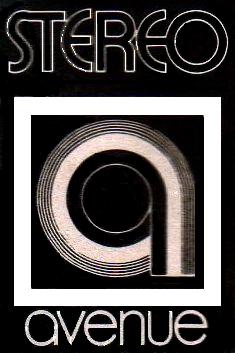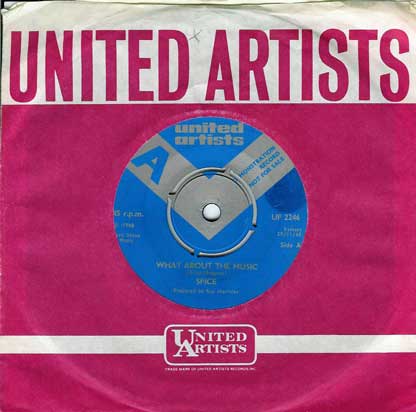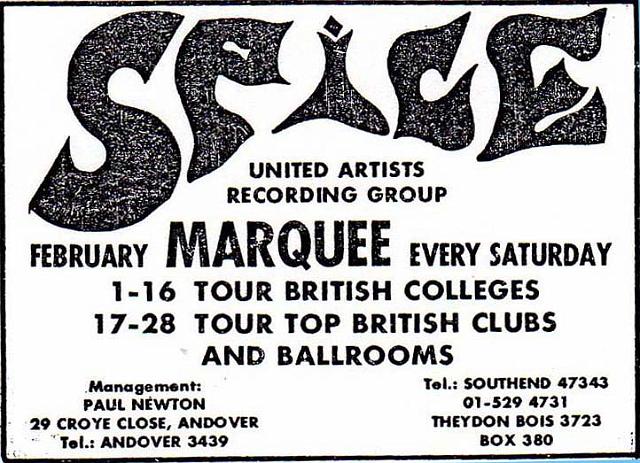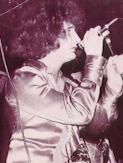![]()
The Building of
a Foundation
1966 - 1969
It isnít hard to imagine the young David Garrick and Mick Box sitting together talking of their dreams for the band
, but surely even they couldnít have foreseen just how much they would achieve together. In fact from these small beginnings they were actively taking the first steps towards worldwide acclaim and fame with what would eventually evolve into fulfilling their wildest dreams. As with everything timing is all important and the
essential ingredients necessary to
As with everything timing is all important and the
essential ingredients necessary to
Before the band began to take shape however crucial elements had to take shape
, and changes had to be made. In the years of struggle many bands begin to question the personnel surrounding them, how they mix together, and if they have what it takes to hold the band together for future hardships. This was indeed facing The Stalkers by 1967.During that period London was booming with talented musicians and bands who had the same dreams, the same hopes and
the same desires as everyone else. Constant searching for the right place to play, the right material, and the chance that maybe someone will notice the hard work. The constant work and with members trying to balance their day jobs with their dreams, the constant work was making it difficult. With all the bubbles bursting it came to the point that the band just couldn't make it without everyone being dedicated to the same cause. So as time would have it, The Stalkers were no more. David and Mick however, retained the dream and began the search to put together the pieces of the next level to success. Little did they know this required cutting ties with so many to get to that point and being a nice guy isn't going to make a problem disappear.Mick was later quoted in Classic Rock Magazine, "I was very focused on becoming a musician for life. Straight from school I took a job in the city of London in an export firm. This was purely to pay the payments on my Les Paul guitar. To save money I cycled twenty miles a day so that I could pay the guitar off quickly thereby not having to pay the train fare. On the last payment I handed in my notice and I was gone."
With the dedication that David and Mick had to becoming full time musicians they set out to form a new band and a new adventure had begun. The search for members went through different channels but eventually they found a drummer in Nigel Pegrum who was form
erly part of Small Faces. After a failed attempt to complete the line-up with Stalkers carry-over Alf Raynor they added bassist Barry Green. Again this didn't work out so after a brief search bass player Paul Newton formerly with Shinn [who laid the foundation for ELP] and a member of the Gods, was recruited. He brought along not only his Fender jazz, but also a van, some equipment. and crucially his dad, Paul senior, who became the bands manager. A new name was picked as well, Spice; and it wasnít
the only change of name. There was already a David Garrick on the music scene so
along the way David chose the surname Byron.
A new name was picked as well, Spice; and it wasnít
the only change of name. There was already a David Garrick on the music scene so
along the way David chose the surname Byron.
David was by now working for an insurance firm in the city, suited during the day but with fashionably longish hair carefully smoothed down behind his ears in an attempt to disguise the rocker within.
He would rush straight from work to a gig, jumping into a van and throwing on his jeans then performing an exhausting set before doing it all over again the next day. Unsurprisingly, holding down a full time job didnít last long, and sharing Mickís aspirations to make music his profession, he quit the job and followed his dreams.The turn of events may have provided an outlet for creativity and searching for dreams
, but the real world left a void with the need to earn extra money to keep going forward. So David started relying upon studio work for much needed income. It's unclear exactly the date, the first song, or the first recording session that marked the start of honing his skills in the studio to become one of the greatest voices ever recorded in rock history, but the trail of his work is endless. With little to no clerical records known to track down credits, the entire story may never surface.Sometime in early 1968 David met Peter Charles Green [born July 31, 1942 in Birmingham, England] who would end up being one of his clos
est friends for the rest of his life. At this time he was recording under the name of Peter Lee Stirling and had numerous successful adventures as a writer, vocalist and musician to his credit in the preceding five years. After a break up of the band he was in, Peter became co-owner of a small recording studio on Osborn Street in London's East Side. This became City of London Studios and that is where David first met him. The bond was a close as any David would make in his career and it shadowed even his work with Mick in his life's time-line.
The Avenue Records label was smaller than the competition of the time but owner Gordon Melville knew which ropes to pull and how to make a mark. This required a stable of talent unmatched by other attempts to cash in on the medium. Names such as Alan Caddy and John Fiddy were in charge of most of the music. Reginald Dwight [later known as Elton John], Peter Lee Stirling, Dana Gillespie, Tony Steven, Laura Lee and Danny Street were some of the vocalists used.
David sang lead or duet vocals on around 140 songs during his work with Avenue which lasted well into 1970; he also sang backing vocals on dozens upon dozens of others. The vocal tracks on these releases were so well renowned that they were leased out to other labels which added alternative backing music to accompany them. It would be a near impossible task to list it all.David wasn't the only member of Spice to take part in these sessions either.
In fact at times the entire band would go in together to work on tracks. They were persuaded by David to accompany him it seemed as Mick Box recalls, "David did these albums monthly and it was a good way to supplement his income. My memory of this time is pretty bad, but I did a couple of them as David wanted my involvement. I wasnít overly keen as my creative head space was in writing new material and not copying others. However I did a few sessions and that was that." Nigel Pegrum made this statement, "Yes Avenue Records does sound familiar, and I think I did play drums on a few cover versions, [which is what I think is what they were doing]. I remember doing some sessions at a little old studio - City of London Studios, I think it was called. It was just a little old warehouse by the Thames that was supposed to be haunted."Paul Newton also
shared in those memories, "I believe that David was already involved in session work with Avenue via a guy called Peter Lee Stirling who was a well known singer at that time. Also involved was Alan Caddy, a former guitarist with "The Tornados" who were originally a backing band for Billy Fury until branching out on their own, with Joe Meek producing a massive hit in the UK & USA, "Telstar". The Avenue studio was somewhere in East London (Bethnall Green I think) and in those formative days for us all these sessions provided a little supplementary income, especially for David. For my own part I did not have a very large involvement but was occasionally offered a session if the regular bass player, John Fiddy, was unavailable. (John subsequently arranged the orchestra section for the title track of the Heep album "Salisbury") At the time John Fiddy was one of the top session players around and so in great demand. Mick Box also had some involvement, probably more than myself. I cannot recollect what tracks I may have played on apart from one of the "Kinks" hits at the time (but I cannot remember which one!)."David eventually got to the point that he was considered one of mainstays in regard to his session work, he was being asked by others to take part in other sessions. Regardless of research this is one area that will always be incomplete, there were little to no credits on any album so much gets lost into speculation. David did in fact add some vocals to a few albums put out under the name of John Smith & The New Sound. Those releases were mixed and produced by producer Bill Wellings; who after the real John Smith left the band, had the rights to the name. With success of a few things during the period of 1965 through 1967, he had a band but the lead vocalist he left to move to Australia. David did a few tracks on two albums released in 1968 but no official credit or conformation can be found on what exactly he did. All we can go by is the music that exist till this day.
Subsequently we could go on for quite a bit on David's session work
, the roots that led to his own personal fame. The contacts he made while working during this period of his career were crucial, some of these contacts would cross his path later in his career, some multiple times. Plenty of bridges were being built during this over-looked time that would benefit himself and the band as a whole as time went by. But as Dana Gillespie remembers this time, "As to memories of David in the studio, I don't really have any except that he was a lot of fun and we laughed a lot. But mostly we just got on and did the work as there was often a full orchestra in the studio too and time being money, there was no time to just hang out. We were always rushing against a deadline before the string players doubled their price at overtime." The pressure to perform under those circumstances must have been greater than most common talents could endure.The band Spice was making the best of what the market would b
ear. As a result the bandís highly talented personnel eventually evolved along an often convoluted route into just the right blend of extraordinary character, drive and ambition to propel the small but ambitious group forward. From there you could say it was just a matter of time that a band with such an array of talent and presence would eventually get noticed. Soon, as the sheer hard work began to pay off, the bigger and more prestigious bookings started to come through. The word was quickly spreading among the fans, venues, agents, labels and gradually; but crucially into the music press. Paul
Newton Sr. had gotten the band a recording contract with
United Artists. On November 29, 1968 they released their only official recording
on that label with a 7" single of
"What About The Music". Since the release had almost no
response from the public, other songs recorded during those sessions never saw
light of day, yet a few may have surfaced later on but it's not been confirmed
by any source. Even though the single didn't have any success
it wasn't a crippling blow to the young and
eager group of musicians, an essential element of that magical formula was
their ambition. Going across town, lugging their own gear across car parks, up
or down stairs and in to some of the most challenging pub venues imaginable.
Despite all that effort audiences could vary wildly from disappointingly small
gatherings to highly charged, enthusiastic rock crowds. Eventually when the
recognition started the road began to stretch further out ahead. Little did they
know just how far it would take them.
Paul
Newton Sr. had gotten the band a recording contract with
United Artists. On November 29, 1968 they released their only official recording
on that label with a 7" single of
"What About The Music". Since the release had almost no
response from the public, other songs recorded during those sessions never saw
light of day, yet a few may have surfaced later on but it's not been confirmed
by any source. Even though the single didn't have any success
it wasn't a crippling blow to the young and
eager group of musicians, an essential element of that magical formula was
their ambition. Going across town, lugging their own gear across car parks, up
or down stairs and in to some of the most challenging pub venues imaginable.
Despite all that effort audiences could vary wildly from disappointingly small
gatherings to highly charged, enthusiastic rock crowds. Eventually when the
recognition started the road began to stretch further out ahead. Little did they
know just how far it would take them.
David's confidence grew along with his ability to Ďworkí an audience and deliver the often challenging vocal parts that were becoming part of the Spice set list. To front such a band he had to have the all-important presence or run the risk being overwhelmed by the sheer quality and sound he was sharing a stage with. His natural flamboyance and charismatic magnetism shone through. David was on the road to rock stardom but the true nature of his soul was to be radio star. His love for Mo-town and the current hits of
the day never left him. He just wanted to fit in and sing; to have others listen and become a star.One thing seemed to be a constant with David, he wasn't very good with first impressions. Upon joining Spice, Paul Newton initially found David to be "a bit egotistical". However Paul did add, "but most singers tend to be. If you play guitar or drums, your instrument is your prop, you're doing something on stage. It's very difficult just to get up on stage with no instrument and stand there and sing. I think you have to be slightly mental to get up on stage anyway and give people the chance to pull you to pieces if they want to but at least if you've got an instrument you've got something else there. You've got to have a lot of bottle to go up and sing and because of all that David was a big head but then singers are."
 Paul
Sr. was working hard trying to get
Paul
Sr. was working hard trying to get
The search for a replacement took some time till the band put an ad in a local music paper which was quickly responded to by Alex Napier. Paul Newton said later on, "Nigel Pegrum who was the original drummer in Spice was a very good drummer, but as the band progressed and became more bluesy and heavy he proved to be a bit light for us. We auditioned a lot of drummers, Alex Napier came for an audition and we decided that he was the one that we wanted. He said he was a single guy so we thought great, he would be able to devote all his time to the band. Alex lived in a different part of London to the rest of us so we used to go round and pick him up in the van for rehearsals and gigs. We soon realized that where he was living there was a woman and three or four kids. When we asked him about it he said it was his sister and he had come down from Scotland to be in the band. He was simply staying with her until he found a place of his own." On May 7, 1969 Alex Napier became an official member of Spice; the band felt the line up was complete, but was it really?
 As manager
As manager
Gerry Bron was a man of his own accord, a strict and disciplined manager. His ideas may have worked in most cases but he insisted on pushing for things that weren't exactly the right direction at times. One particular story from Paul Newton highlights Bron's early vision for the band, "Gerry Bron put us in the studio and we started recording the stuff we were doing on stage. At that time Gerry had an involvement in an agency in the States, the people who handled Three Dog Night and he came back from the States with an armful of Three Dog Night records. He picked three or four tracks that he said we should record with a view of releasing one as a single. We did actually record one and we made a reasonable job of it but we did impress on Gerry that we didn't want that sort of bubble gum pop song to be our first release in 1969/70 and it became evident thought this time that we needed a keyboard player." The song in reference was 'Celebrate' and was never released during that period.
Mick was a big Vanilla Fudge admirer and saw the introduction of the Hammond sound sitting in with his own distinctive guitar; and Davidís incredibly wide range and often theatrical vocal range, as a possible way forward. It was a development that would unlock another vital key. To satisfy the need for a keyboardist, Bron brought in session musician Colin Wood to add Hammond. Paul Newton recalled, "Gerry had actually brought someone in just on a session basis. David had begun to learn a little of piano but he was just at the learning stage and wasn't really experienced enough. So Gerry called in Colin purely on a session basis, he was never actually part of the band as such. He was a bit of a jazzer who'd done stuff for Gerry with with Richard Barnes and Manfred Mann. He was a fine musician and he was somewhat older than us so it wasn't really a case that he would be right to join the band." Yet the truth is now known that Colin was asked to join the band by Gerry Bron. This fact however was not known to the band till years later, however the move proved to be impossible for Colin who couldn't interrupt his teaching schedule to fulfill the band's growing commitments.
Paul continued with, "We needed a keyboard player on a full time basis and I thought with the kind of stuff we were doing Ken would be the right man. We'd bumped in to him a couple of times when we did gigs as Spice and he was with Cliff Bennett playing guitar and occasionally he and I would go out for a meal or a beer with our wives. It just seemed a natural sort of thing to get someone in the band that we already knew." So Paul made a phone call to Ken Hensley to ask him to sit in and seeing the potential, they decided that this was what the band needed to expand their sound and recruited the amazingly talented Ken Hensley from his latest band Toe Fat; as well as being a former member of the Gods with Newton. Since Ken liked the potential of the band and the different sound, he joined with the same anticipation of stardom shared by David and Mick.
Despite the obvious ability, the hiring of Ken Hensley was viewed as something of a gamble. "My father said at the time that although he thought Ken would be ideal for the job he thought it might be a wrong move." Paul Newton stated but continued with, "And I had one or two misgivings, but there can be no doubt that he was absolutely right for the band. There were difficulties, Ken was disruptive, but at the end of the day if we'd got someone else in the band, the band may or may not have made it, but we certainly wouldn't have the wonderful songs that he wrote." Gerry Bron wasn't one of the doubters of the move to bring in Ken. As Paul stated, "I remember the first rehearsal we did with Ken, we played Gypsy and Gerry came in the door and was absolutely god smacked because the sound was such a big modern sound for those days."
 So
Spice booked Hanwell Community Center in Shepherds Bush, West London for a week
to rehearse and write new material. At one point the band practiced
at the same time as Deep Purple, which is well documented and mentioned many
times. In the 30th Anniversary Edition release of 'In
Rock' drummer Ian Paice wrote in the liner notes about Hanwell, "It
was always available and it was cheap, it was the only place that we found where
we could make a lot of noise." Mick remembered Hanwell fondly
and recalled, "We wrote most of what became Very 'Eavy Very 'Umble at
Hanwell Community Center. The funny thing was that Deep Purple was
rehearsing in the room next to us. You can imagine the kind of
racket we were both making between us!" Deep Purple must have been
impressed with the sound they heard since they invited Spice to open for them on
their next tour to support the 'In Rock' album.
So
Spice booked Hanwell Community Center in Shepherds Bush, West London for a week
to rehearse and write new material. At one point the band practiced
at the same time as Deep Purple, which is well documented and mentioned many
times. In the 30th Anniversary Edition release of 'In
Rock' drummer Ian Paice wrote in the liner notes about Hanwell, "It
was always available and it was cheap, it was the only place that we found where
we could make a lot of noise." Mick remembered Hanwell fondly
and recalled, "We wrote most of what became Very 'Eavy Very 'Umble at
Hanwell Community Center. The funny thing was that Deep Purple was
rehearsing in the room next to us. You can imagine the kind of
racket we were both making between us!" Deep Purple must have been
impressed with the sound they heard since they invited Spice to open for them on
their next tour to support the 'In Rock' album.
December 1969 found the band back in Lansdowne Studios recording again. This time it was for the right reason; the material they wanted was ready to finally finish. The sound was what they wanted and it was felt the direction had finally settled into something more stable. The line-up was tight and Bron had secured a deal with Vertigo Records to have the album released on their label. With the excitement of finally establishing themselves, a new era was dawning and yet nothing seemed set in stone. Christmas 1969 saw the fast approaching one hundredth anniversary of the death of Londonís own Charles Dickens. Everywhere you went you were greeted by posters and reminders of the life and work of the literary genius. Yet a new chapter of the band was being written while just attempting to record their first album. After close to six months they still didn't have a finished product.
Back To Biography I Back To Home